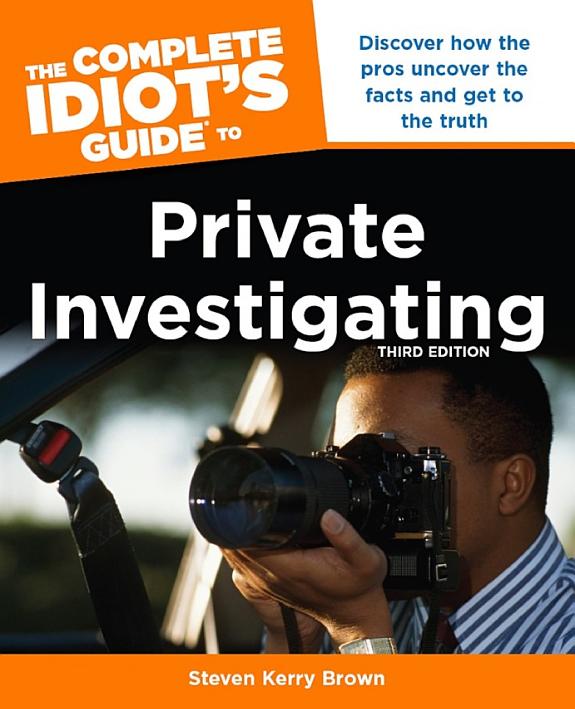
Armchair travel around the world!
Start your reading adventures with our FREE Reading Atlas.

- Around the World in 14 Books
- 7 Thrilling Book Series
- 6 Audiobooks That Are Like Theater For Your Ears



This how-to for private detection (352 pages) was published in March of 2013 by DK. The book takes you to the back office of a detective agency. David read The Complete Idiot's Guide to Private Investigating and loved it; it wouldn't be on our site if he didn't recommend it.
Bookshop.org is an online bookstore with a mission to financially support independent bookstores and give back to the book community.

Want to spy on a day in the life of a real PI? Eager to know the steps to becoming a detective yourself? If you don’t mind being an ‘idiot,’ this book is a great resource and a good time.
Author Steven Kerry Brown has plenty to say about the detective biz, and it’s all grounded in real-world experience: He was a private investigator for twenty years and an FBI agent for over a decade.
Like a Private Detection 101 course, the first section is about how to begin a career: How do you get some experience? What’s the deal with licensing? What kind of equipment do you need?
The next section gets into the nitty-gritty of the good stuff: how to dig for information, how to find someone (who may or may not want to be found) —and the surprising utility of courthouse records. Brown says you can make a solid living by understanding your local courthouse records system. He also divulges which websites to use for online searches and how to ‘break a number,’ which is detective-speak for finding the human attached to a particular phone number. As he goes along, he dispels some of the myths perpetuated by Hollywood, including ‘The Myth of the Untraceable Prepaid Cell Phone,’ for instance.
The book’s third section is all about technique: the value of canvasing a neighborhood and how to do it, stakeouts, and running surveillance on foot or by car, alone or with a team. The final two segments of the book address how to bring a runaway teenager back home and how to manage electronic surveillance. In addition to providing practical guidance on detection, he also covers the legal aspects of a PI case, including tips on how to talk to a judge.
There are all sorts of interesting bits in this book that deliver great stories and creative how-tos. One of the war-story highlights explains how you might trick a hotel into giving you the receipt of another guest that you need for evidence.
Let’s say a wife contacts you and says she’s sure her husband was in a Sheraton with a woman two weeks ago. Her husband’s name is Gary Fielding, and she wants you to get proof that Gary was at the hotel.
Your first step is to call the hotel and make a reservation for the next day. The reservation is for two of you: you and good ol’ Gary Fielding. The next day, you check in and alert the front desk that Fielding has yet to arrive. ‘Can you tell him what room I’m in when he gets here? Thanks, doll.’
An hour or so later, you ring accounting and identify yourself as Gary Fielding, along with your room number. You explain, in a sympathy-inducing, mildly anxious voice, that you stayed in the hotel last month, but you’ve lost your copy of the statement. You need it for your company’s expense report — is it possible to get a copy of the receipt delivered to the room?
Accounting delivers, and now, you have proof that good ol’ Gary might not be so good after all.
If you’re curious about the day-to-day of a private investigator, this book delivers — no stakeouts or shootouts required.
As a PI, your most important client is the truth. You must be impartial in this pursuit. The irony is that your clients don’t always want the truth. Does a husband really want to hear that his wife has been cheating on him with his best friend for the last three years? Or does an insurance company want to find out that the person it’s accusing of insurance fraud is, in fact, telling the truth? The answer to these and many other questions posed by clients is a resounding no. Yet it’s your job to dip up the facts, present them to your client, and let the chips fall where they may. — Steven Kerry Brown
Wanna help us spread the word? If you like this page, please share with your friends.
Strong Sense of Place is a website and podcast dedicated to literary travel and books we love. Reading good books increases empathy. Empathy is good for all of us and the amazing world we inhabit.
Strong Sense of Place is a listener-supported podcast. If you like the work we do, you can help make it happen by joining our Patreon! That'll unlock bonus content for you, too — including Mel's secret book reviews and Dave's behind-the-scenes notes for the latest Two Truths and a Lie.
Join our Substack to get our FREE newsletter with podcast updates and behind-the-scenes info — and join in fun chats about books and travel with other lovely readers.

We'll share enough detail to help you decide if a book is for you, but we'll never ruin plot twists or give away the ending.
Content on this site is ©2026 by Smudge Publishing, unless otherwise noted. Peace be with you, person who reads the small type.